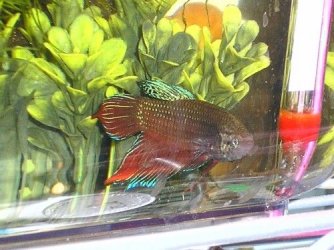VickiPS
New Member
Just thought I'd show a pic of my wild betta splendens male. I read in a forum recently (from someone who I thought would know better) that wild bettas are dull muddy brown. B) Obviously they haven't seen a wild betta who's happy, unstressed and has female company!
My pair were wild-caught in Thailand. The male is Dii Jay (which means happy or glad in Thai) and the female is Chookh (luck) -- so named because I got them just after Lunar New Year.
They've just gone into the spawning tank, and it's been fascinating to watch the early courtship ritual and compare it to the breeding behaviour in domestic bettas.
My pair were wild-caught in Thailand. The male is Dii Jay (which means happy or glad in Thai) and the female is Chookh (luck) -- so named because I got them just after Lunar New Year.
They've just gone into the spawning tank, and it's been fascinating to watch the early courtship ritual and compare it to the breeding behaviour in domestic bettas.


 ) That's why I didn't comment.
) That's why I didn't comment.